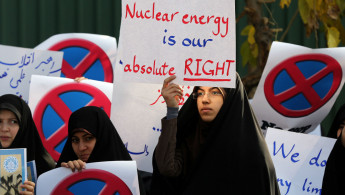Crunch deadline looms in Iran nuclear talks
Negotiations over Iran's nuclear programme are entering their final phase with just 48 hours until a deadline for Tehran and six world powers to reach a deal.
With the June 30 deadline looming, US Secretary of State John Kerry was meeting Sunday in Vienna with Iranian Foreign Minister Mohammad Javad Zarif, their third encounter since Saturday. Other foreign ministers are expected to join.
The goal of the talks involving Iran and the US, Britain, China, France, Germany and Russia is a deal that would reduce Tehran's capacity to make nuclear weapons in exchange for sanctions relief.
On Saturday, diplomats said Iran was considering a US-backed plan for it to send enriched uranium to another country for sale as reactor fuel, a step that would resolve one of several outstanding issues.
The French Foreign Minister, Laurent Fabius said on arrival in the Austrian capital that significant differences remain and must be resolved:
"What we want is a robust deal that recognises Iran's right to civil nuclear power, but guarantees that Iran gives up definitively the nuclear weapon," Fabius said.
For this there were three "indispensable" conditions, he said: A lasting limitation of Iran's research and development capacity, rigorous inspections of sites, including military if needed, and the automatic return of sanctions if Iran violates its commitments.
"These three conditions respect Iran's sovereignty. They have still not been accepted by everybody, yet they form the key base of the triangle that forms the robust agreement that we want," he said.
The self-imposed deadline for a deal under which Iran would cut back its nuclear programme in exchange for relief from economic sanctions, expires on Tuesday.
"We have a lot of hard work to do. We have some very tough issues," US Secretary of State John Kerry said according to a State Department draft transcript.
"I agree. Maybe not on the issues. But on the fact that we need to work really hard in order to be able to make progress and move forward," Iranian Foreign Minister Mohammad Javad Zarif was cited as saying in the transcript.
Nonetheless, Kerry also said he was "hopeful" of a successful outcome. His meeting with Zarif ended after 90 minutes.
The main differences are on the pace and timing of sanctions relief for Iran in return for its steps to restrain its nuclear programme and on the nature of monitoring mechanisms.
US and European negotiators also want to ensure there is a mechanism for restoring sanctions if Tehran fails to meet its commitments under any future accord aimed at ending a 12-year nuclear standoff between Iran and the West.
The United States, Israel and some Western governments claim that Iran has been trying to develop a nuclear weapons capability but Tehran says its programme is for peaceful purposes and that civil nuclear power is a right for all states.
In November, the seven nations involved in the talks set a late March deadline for a framework agreement, which they ultimately reached on April 2, and a June 30 deadline for a comprehensive deal.
The real deadline is not June 30 but July 9, diplomats say. The US delegation must present the deal to Congress by July 9 if a mandatory congressional review period before President Barack Obama can begin suspending sanctions is to be limited to 30 days.
After July 9, the review will last 60 days, according to a law passed recently by US legislators.
Negotiators involved in the talks fear that such a lengthy delay, which would also hold up the cancellation of United Nations nuclear-related sanctions by the Security Council, would be too long and would create the opportunity for any deal agreed in Vienna to unravel.





 Follow the Middle East's top stories in English at The New Arab on Google News
Follow the Middle East's top stories in English at The New Arab on Google News

![Israeli forces ordered bombed Gaza's Jabalia, ordering residents to leave [Getty]](/sites/default/files/styles/image_330x185/public/2176418030.jpeg?h=a5f2f23a&itok=_YGZaP1z)
